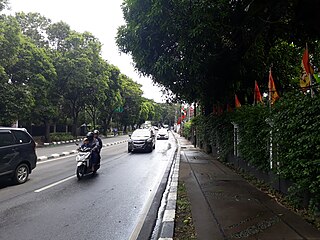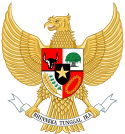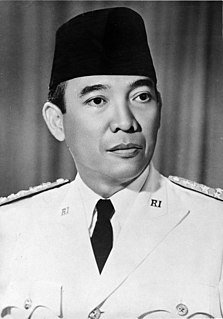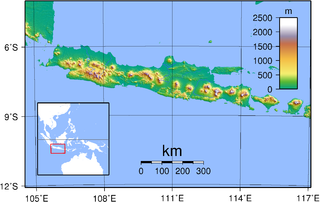
The politics of Indonesia take place in the framework of a presidential representative democratic republic whereby the President of Indonesia is both head of state and head of government and of a multi-party system. Executive power is exercised by the government. Legislative power is vested in both the government and the two People's Representative Councils. The judiciary is independent of the executive and the legislature.

The Indonesian Democratic Party of Struggle is an Indonesian political party, and the party of the current President of Indonesia, Joko Widodo.
The National Awakening Party, frequently abbreviated to PKB, is an Islam-based political party in Indonesia.

Elections in Indonesia have taken place since 1955 to elect a legislature. At a national level, Indonesian people did not elect a head of state – the president – until 2004. Since then, the president is elected for a five-year term, as are the 560-member People's Representative Council and the 128-seat Regional Representative Council.

The Indonesian National Party is the name used by several political parties in Indonesia from 1927 until the present day.

The Crescent Star Party is a political party in Indonesia.
The Indonesian Justice and Unity Party is a political party in Indonesia.
The Post-Suharto era in Indonesia began with the fall of Suharto in 1998 during which Indonesia has been in a period of transition, an era known in Indonesia as Reformasi. A more open and liberal political-social environment ensued following the resignation of authoritarian President Suharto, ending the three decades of the New Order period.

Legislative elections were held in Indonesia on 29 May 1997. There were actually three elections in one as voters were electing members of two levels of regional government as well as the House of Representatives. This was to be the last election of President Suharto's New Order regime, which collapsed a year later. Like the preceding New Order elections, it was won outright by the Golkar organization.

Indonesia's second legislative election, and the first under the New Order regime, was held on 3 July 1971. There were 10 participants; 9 political parties and the "functional group" Golkar.

Indonesia's third legislative election, and the second under the New Order regime, was held on 2 May 1977. There were three participants; the two political parties and functional groups Golkar.

Indonesia's fourth legislative election, and the third under the New Order regime, was held on 4 May 1982. There were three participants; the two political parties and the "functional group" Golkar.

Indonesia's sixth legislative election, and the fifth under the New Order regime, was held on 9 June 1992. Although the share of the vote won by Golkar declined, and the two parties saw their votes rise, the government organisation still won a clear majority.

Legislative elections were held in Indonesia on 9 April 2009 for 132 seats of the Regional Representative Council (DPD) and 560 seats of the People's Representative Council (DPR). A total of 38 parties met the requirements to be allowed to participate in the national elections, with a further six contesting in Aceh only. The Democratic Party of President Susilo Bambang Yudhoyono won the largest share of the vote, followed by the Golkar Party and the Indonesian Democratic Party – Struggle.
The Patriot Party was a political party in Indonesia. It was established as the Pancasila Patriot's Party as a result of a deliberations at the sixth national conference of the Pancasila Youth organization in 1996. At the time, the organization's political goals were channeled by Golkar, but in its conference the year after the 1998 Fall of Suharto, Pancasila Youth withdrew from Golkar. The conference also decided the time was right to establish a political party, and it was declared on 1 June 2001, the anniversary of Sukarno's Pancasila speech. The party was officially and legally established two years later. Thus the Patriot Party was described as the political wing of the Pancasila Youth.

Legislative elections were held in Indonesia on 9 April 2014 to elect 136 members of the Regional Representative Council (DPD), 560 members of the People's Representative Council (DPR) and members of regional assemblies at the provincial and regency/municipality level. For eligible voters residing outside Indonesia, elections were held on 5 or 6 April 2014 based on the decision of electoral commission of each different countries.

The 27 July Incident was an attack by Indonesian government forces on the head office of the Indonesian Democratic Party, which was being occupied by supporters of recently ousted party leader Megawati Sukarnoputri. It was followed by two days of riots in Jakarta.















